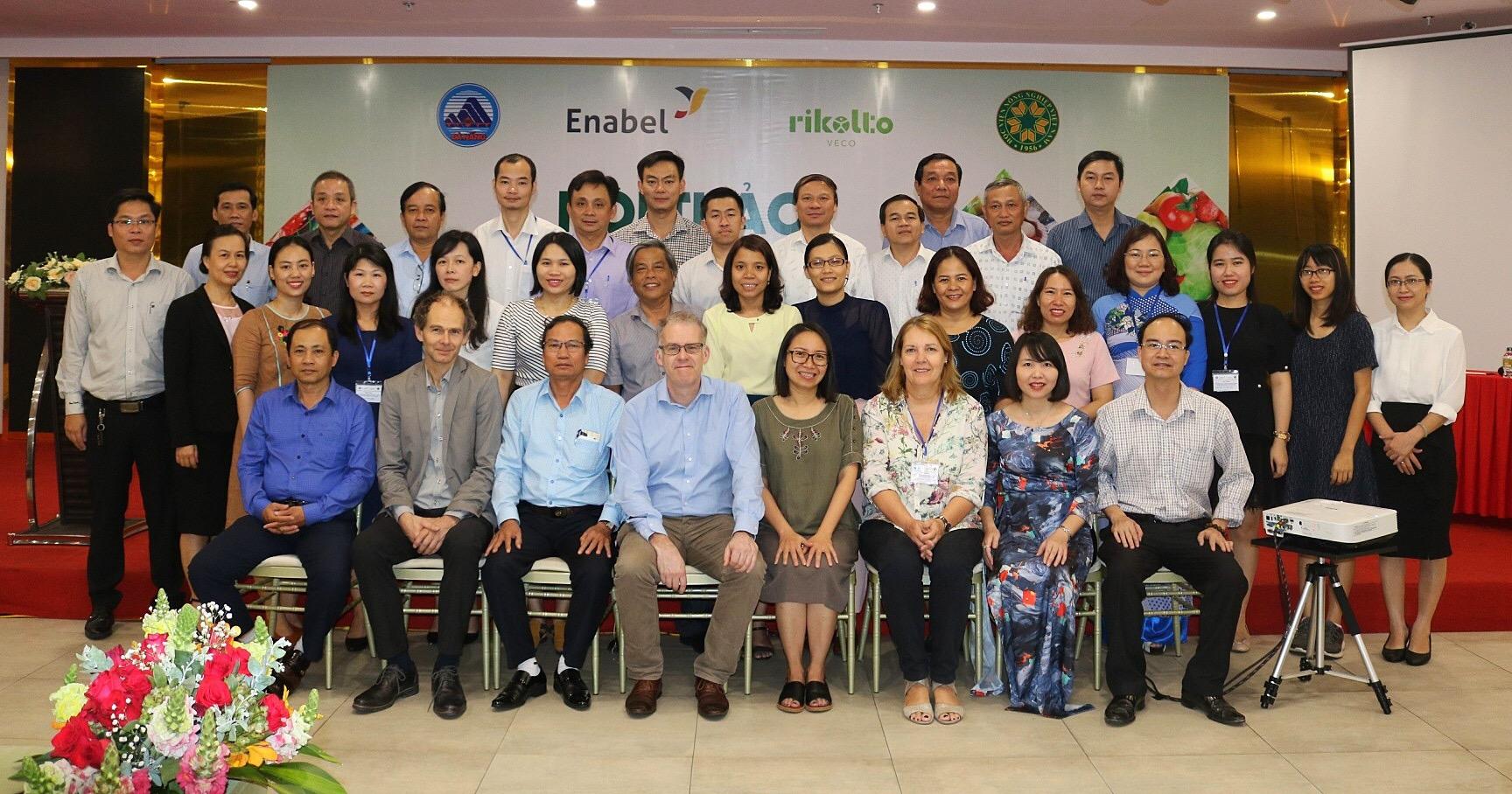Opzoeken
1785 - 1800 van 2520 nieuws bekijken
-
workshop on Food safety in Danang
Krista VERSTRAELEN | 20/03/2019
https://eng.vnua.edu.vn/news-and-events/danang-is-funded-to-build-a-food-smart-city-33669.html
-
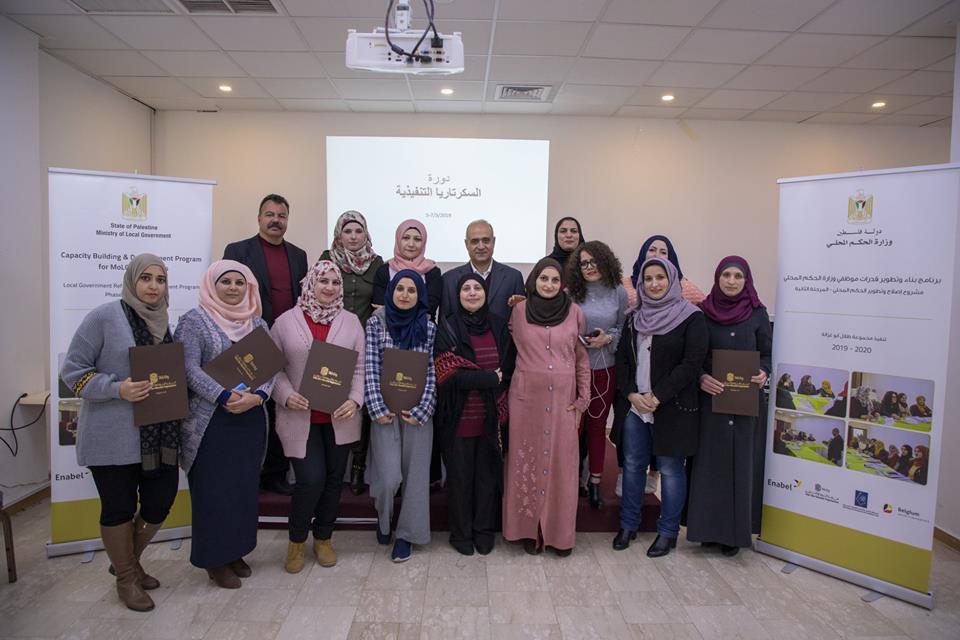
The Ministry of Local Government launches the Capacity Building and Development Program for the MoLG staff
Laura SCHILLEMANS | 18/03/2019
The department of Human Resources Development of the Ministry of Local Government concluded a training course called "Executive Secretariat". The training was organized for employees from all directorates and departments in the ministry.This training is part of the Ministry’s vision and strategy to develop the capabilities of its employees in order to provide the best services to LGUs or citizens.Safwan Al Halabi, Director General of the Human Resources Development Department at the Ministry of Local Government, said “The executive plan of the HR Department is to work with all donors in 2019, targeting all the different departments in the ministry and directorates." Yara Njoom, an employee of the Project department, said "As a new employee in the ministry, I acquired many new skills. I learned how to deal with citizens, how to work with my computer software and the file archiving system, as well as how to handle incoming mail and reporting mechanisms." "This course represents the first of the outputs of the capacity building program for the employees of the Ministry of Local Government, which was launched by the ministry for the duration of one year.” said Doaa’ Qutub from Enabel.------------ This training is part of the Local Government Reform and Development Program (LGRDPII), which is implemented by the Ministry of Local Government in collaboration with the Municipal Development and Lending Fund, funded by the Belgian government through Enabel
-

Protection des bassins versant via les boisements
Diane NSENGIYUMVA | 28/02/2019
Dans le cadre de la mise en œuvre du PAIOSA, des activités de reboisement ont été réalisés dans les bassins versants du périmètre irrigué de l Imbo Nord selon l’approche de Gestion participative et communautaires. Ce vidéo montre les membres du Groupement de gestion forestière pendant les travaux d’entretien et de protection d’un boisement.
-
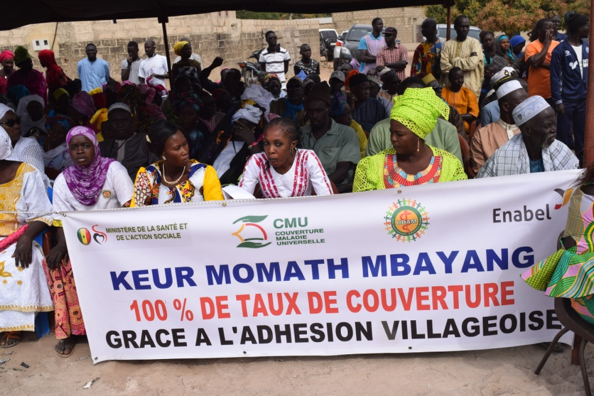
Assurance Santé en Afrique Sub-Saharienne
Aïda SECK | 26/02/2019
De 2012 à 2017, la coopération gouvernementale belge et les autorités sénégalaises ont mis en œuvre un projet de 17 millions d'euros pour soutenir l'offre et la demande de services de santé visant à organiser l'assurance maladie pour les ruraux pauvres (PAODES1). Le projet avait pour objectif de développer une approche durable visant à apporter une assurance maladie aux communautés rurales du Sénégal. PAODES a accompagné le ministère de la Santé dans ses efforts pour réformer les structures de financement des soins de santé, en mettant en place un système d'assurance maladie et en rationalisant les services de soins de santé de base aux niveaux local et du district. En fin de compte, l’ambition du projet était de proposer au ministère de la Santé un modèle d’assurance maladie pour les ruraux pauvres, qui avait été testé suffisamment longtemps et à une assez grande échelle pour en tirer les enseignements en vue de l’extension du modèle. Pour consulter cet article, cliquez su le lin: https://www.enabel.be/sites/default/files/006_introducing_large-scale_health_insurance_for_the_rural...
-
workshop on Food safety in Danang
Krista VERSTRAELEN | 26/02/2019
The study "Mapping of food value chains and formulation of a food smart city strategy by 2025 with a vision towards 2030 for Danang city" is carried out by Vietnam National University of Agriculture (VNUA) with the Food Safety Management Authority of Danang, supported also by Rikolto (Belgian NGO). This dynamic workshop brought several stakeholders together, with participation from Rikolto &Prof. E. Mathijs (KULeuven)
-
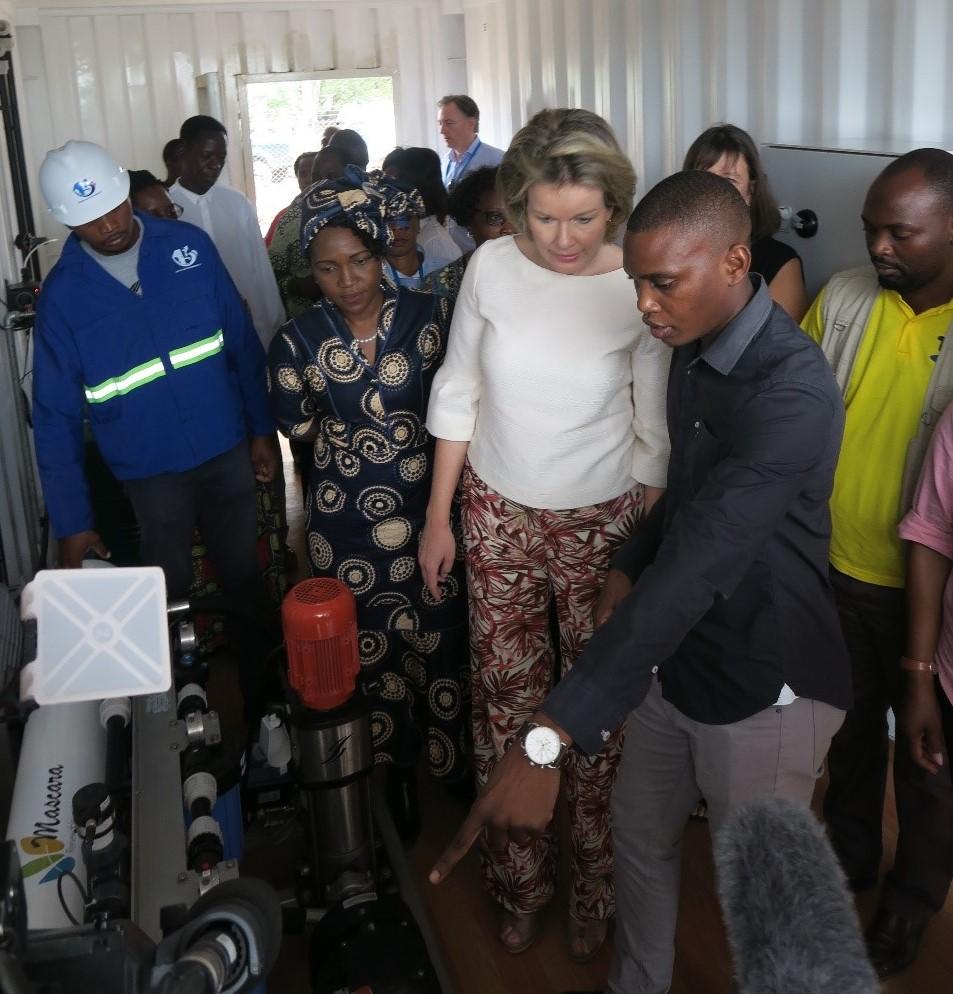
Her Majesty the Queen's visit to Enabel Water Gaza Project
Akila MUNIR | 19/02/2019
Her Majesty the Queen's role as an SDG Ambassador Since the adoption of the United Nations’ Sustainable Development Goals (SDGs) in 2015, a group of 17 eminent Ambassadors were appointed to promote action to achieve the SDGs by 2030. The SDGs represent a commitment by all nations to work together in enduring partnerships to end poverty and hunger, protect the planet, achieve shared prosperity and ensure peace for present and future generations. In early February, Queen Mathilde of Belgium in her capacity as Ambassador of the United Nations’ SDGs, paid a three-day working visit to Mozambique. This is the Queen’s first official visit to the Sub-Saharan country since Mozambique became a partner country of Belgium in 2001. Recently, her Majesty also visited Ghana in 2016 in her capacity as SDG Advocate. Queen Mathilde engaged with local communities and encouraged initiatives that have a positive impact on the everyday lives of the local population. Her visits had a focus on projects that promote economic empowerment of women, combat violence against women and promote improved education and health in the country. Her Majesty’s agenda also included projects that combat climate change in Mozambique, one of which is Enabel’s project of “Water Supply and Management contributing to Food Security in Gaza Province” (also known as Water Gaza). Outline of Her Majesty the Queen’s Visit Between the 4th and the 7th of February 2019, Her Majesty’s visit covered Maputo province and capital city and Gaza province, where several Belgian funded interventions are located. On the first day of the visit, her Majesty met the Minister of Finance and Economy, H.E. A. Maleiane as well as the Minister of Gender, Children and Social Action, H.E. C. Chaúque Oliveira, followed by greeting the beneficiaries of the Light for the World NGO and a visit to the Socio-Cultural association Horizonte Azul, which focuses on human rights, gender equality and empowerment of vulnerable children and women. Upon the Queen’s arrival in Gaza Province, the Governor hosted a dinner to welcome Her Majesty and to discuss what the different Belgian funded projects have accomplished in the province. On day 2, Queen Mathilde visited several projects in the Gaza Province, including the Enabel Water Gaza Project in the local village of Dzindzine, a UN Women Empowerment project funded by Belgium in Chinhacanine, and finally a district hospital in Chokwe where she addressed mental health issues. Upon returning to Maputo, Queen Mathilde had a meeting with victims of domestic violence and child marriages. On day 3 of the visit, Queen Mathilde of Belgium met with H.E. President Nyusi of Mozambique had a meeting, and later delivered a lecture on “Sustainable Development Goals Towards A Better Future” at Eduardo Mondlane University. Her Majesty addressed students, professors, public and private institutions “to grasp every opportunity to work together on this ambitious development agenda for the future.” Queen Mathilde then visited the National Disaster Management Institute to observe how the use of technology improved national disaster risk management systems. Her Majesty ended her visit with a trip to a local health centre in the district of Marracuene, Maputo province, which provides accessible care to over 23,000 people. Desalination water supply plant in Dzindzine Her Majesty’s trip included a visit to one of the six water supply systems in small village of Dzindzine in Gaza Province, which forms part of the Enabel Water Gaza Project. The infrastructure consists of water desalination systems using photo-voltaic energy without the use of batteries. In the village of Dzindzine, a three-kilometer long network of water distribution pipes was installed alongside a public fountain station with six taps as well as 22 individual household taps. This significantly reduces the distance and time taken to access drinkable water and allows the local population – especially women and children - to lead more productive lives. The water supply plant became operational in September 2018 and has increased access to safe and affordable drinking water to over 1,100 beneficiaries, while promoting the use of renewable energy for sustainable development. Enabel’s efforts in achieving several SDGs across the globe can be evidenced through its many interventions, one of them being the Water Gaza project in Mozambique, whose widespread impact of reaching 57,000 people was only made possible due to enduring partnerships and unity towards a common goal. This project contributed to the achievement of SDG 6 by improving access to clean water and sanitation, SDG 7 as renewable energy is used to power the desalination unit, SDG 3 of improved healthcare as water is now safe to drink, promotes better sanitation and is essential to living a healthy life, SDG 5 because women can spend more time on education and income generating activities, SDG 2 as water is essential to ensure farming activities and food security, and ultimately combat the challenges of climate change (SDG 13). Enabel aims to build a sustainable world where women and men live under the rule of law and are free to thrive. As Queen Mathilde of Belgium stated, “Agenda 2030 is based on solidarity. Solidarity between countries and regions, cities and rural areas.”
-

VET Toolbox YEAR 1!
Thibaut MONNIER | 18/02/2019
During its first year in operation, the VET Toolbox has:DEVELOPED A FIVE YEAR BUSINESS PLAN which prioritizes demand-driven VET in developing countries;ADVISED 9 organizations in 7 COUNTRIES in private sector involvment, inclusiveness and evidence-based policy making in VET;BUILT a strong and innovative partnership between 5 European leading Agencies PRODUCED its first tool on management of training institutions;LAUNCHED a 4 million EUROS call for proposals on inclusion in VET;DEVELOPED a brand new website sharing knowledge, stories and best practices in VET OFFICIALLY LAUNCHED the VET Toolbox in Belgium, Ghana, Senegal, Mali and Vietnam;CO-ORGANIZED a regional seminar involving more than 100 participants from 18 African countries.Read more on https://urlz.fr/8Vrc
-
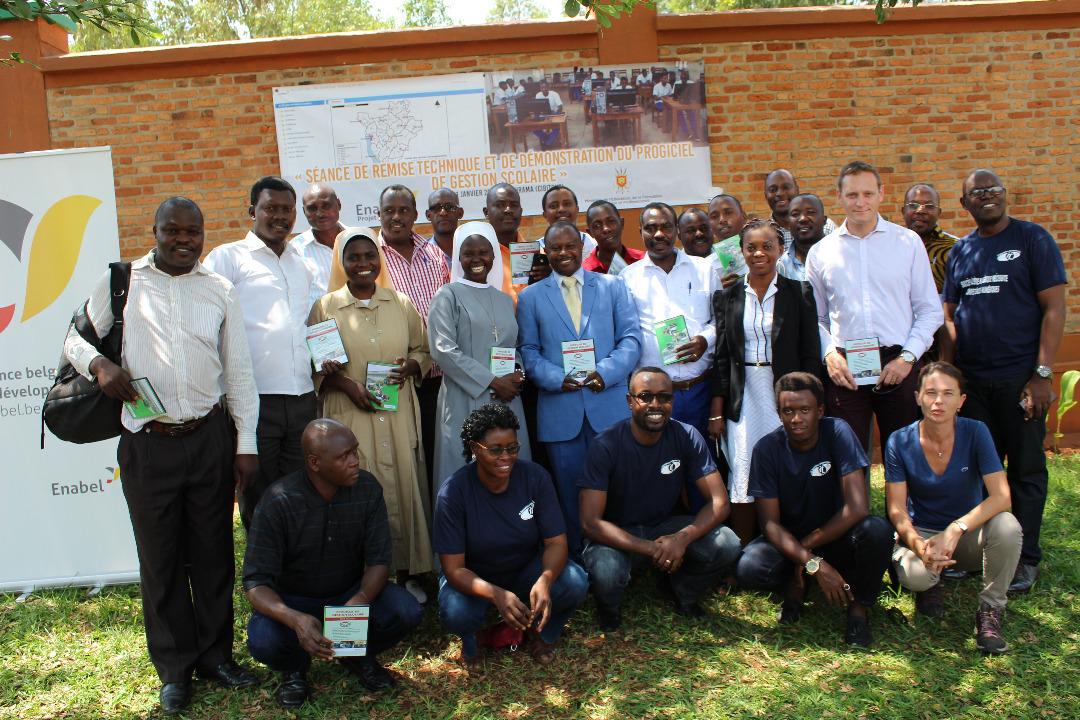
Lancement du Progiciel de Gestion Scolaire (PGS) au profit de 13 Centres d’Enseignement des Métiers (CEM)
Etienne RODENBACH | 12/02/2019
http://www.iwacu-burundi.org/enabel-pour-une-gestion-scolaire-efficace-des-cem/ L’Agence belge de développement (Enabel), à travers le projet Appui Complémentaire à la Formation Technique et Professionnelle (ACFPT) vient de lancer un Progiciel de Gestion Scolaire (PGS) au profit de 13 Centres d’Enseignement des Métiers (CEM). Les directeurs de ces centres se frottent les mains. Des rapports en un clic, la transparence de toutes les activités, des services désormais rapides… les Centres d’Enseignement des Métiers(CEM) se targuent d’une gestion scolaire dorénavant automatique et efficace. Ce Progiciel de Gestion Scolaire (PGS) a été lancé jeudi 31 janvier 2019 à Karurama dans la province Cibitoke en présence des directeurs des CEM bénéficiaires. Développé au profit de 13 CEM soutenus par Enabel, le PGS est un outil numérique complet pour l’administration et la gestion intégré du centre. Il a été développé pour permettre aux responsables d’un centre scolaire d’avoir la maîtrise permanente et totale de la gestion des activités principales du centre, d’après le représentant adjoint d’Enabel, Etienne Rodenbach. Ce système contribue de surcroît à aider les directions des centres appuyés par le projet ACFPT à s’acquitter de leurs devoirs et responsabilités d’une manière transparente. Cette application a été conçue en tenant compte des contraintes du système éducatif de l’enseignement technique et professionnel. Il obéit à deux contraintes majeures : l’efficacité et la simplicité. Dans son ensemble, le progiciel comprend huit modules : modules de gestion des élèves ; Modules de gestion d’insertion des lauréats ; Modules de gestion de ressources humaines ; Modules de gestion de stock ; Modules de gestion financière ; Modules des infrastructures et équipements techniques ; Modules de gestion des ressources numériques ainsi que la gestion de livraison de matériel. Des directeurs des CEM soulagés Les responsables des CEM bénéficiaires se frottent les mains. Ils parlent d’un progiciel qui va rendre les activités faciles et rapides dans leurs établissements. C’est un directeur du CFP Karurama satisfait, rencontré dans son bureau lors d’une visite de ce lancement technique. Devant son ordinateur, il semble maîtriser le progiciel. « J’ai entre les mains toute la situation du centre. Je n’ai pas besoin de demander les données au secrétaire », lance-t-il, l’air satisfait. Si un employé a besoin du matériel ou d’un congé, poursuit-il, inutile de se déplacer. Il l’écrit dans le progiciel et les concernés le voient directement. « Je ne fais qu’approuver ou rejeter sa demande». Une technique qui, selon lui, permet de réduire les dépenses. « Avant, il fallait écrire ou remplir les formulaire à imprimer… » Même son de cloche chez le directeur du CFP Rumonge, Gaspard Nibaruta. Avant la conception de ce progiciel, témoigne-t-il, la gestion du personnel était difficile. « Ce progiciel va nous permettre de contrôler les retards et absences des enseignants et des élèves. » De surcroît, la gestion financière sera désormais facile et transparente. « Il n’y aura plus de détournements. Le comptable ne pourra plus faire une dépense à l’insu de la direction. » Ces directeurs indiquent que la plupart des chefs de service de leurs centres savent déjà utiliser ce progiciel. Ils évoquent toutefois quelques défis : les ordinateurs sont insuffisants. Certains chefs de service ne savent pas manier l’ordinateur. La connexion internet pour synchroniser les données est quelque fois limitée. La Direction générale applaudit Le Directeur général de la formation technique et professionnelle, Pascal Nshimirimana, n’a pas caché sa satisfaction. Pour lui, les rapports étaient un casse-tête. Il fallait se déplacer à l’intérieur du pays pour s’enquérir de la situation. Il indique que les rapports lui parvenaient très difficilement, très tardivement. Le représentant adjoint d’Enabel parle d’un progiciel qui offre une meilleure gestion des Centres de formation. D’après lui, les Centres de formation envoyaient leurs rapports par courrier dans des véhicules de transport avec risque de disparaître. A cause de ces difficultés, les rapports étaient trimestriels alors qu’ils devraient être hebdomadaires. « Mais avec ce progiciel, tout est automatisé. Tout est sous contrôle. Il suffit de me connecter au PSG dans ma machine pour voir tout ce qui se passe dans ces 13 CFP. » M. Nshimirimana loue un outil digital qui permet une gestion transparente et intégrée des CEM chaque jour. « Plus de magouilles, de malversations…tout est transparent. » D’après lui, les présences des enseignants et des élèves sont désormais contrôlés. Et de rassurer qu’il va plaider auprès du gouvernement pour étendre ce progiciel dans tous les Centres de formation du Burundi. Ce progiciel a été conçu dans le cadre du projet « Appui complémentaire à la formation professionnel et technique (ACFPT) » qui date de plus de 4 ans, d’après le représentant adjoint d’Enabel. « Il nous est apparu très important de concevoir ce logiciel », indique M. Rodenbach. Deux objectifs majeurs à l’origine : une meilleure gestion de tous les différents aspects du centre et la centralisation de toutes les données. « Car dans ce secteur, l’on a souvent du mal à quantifier les activités. »
-
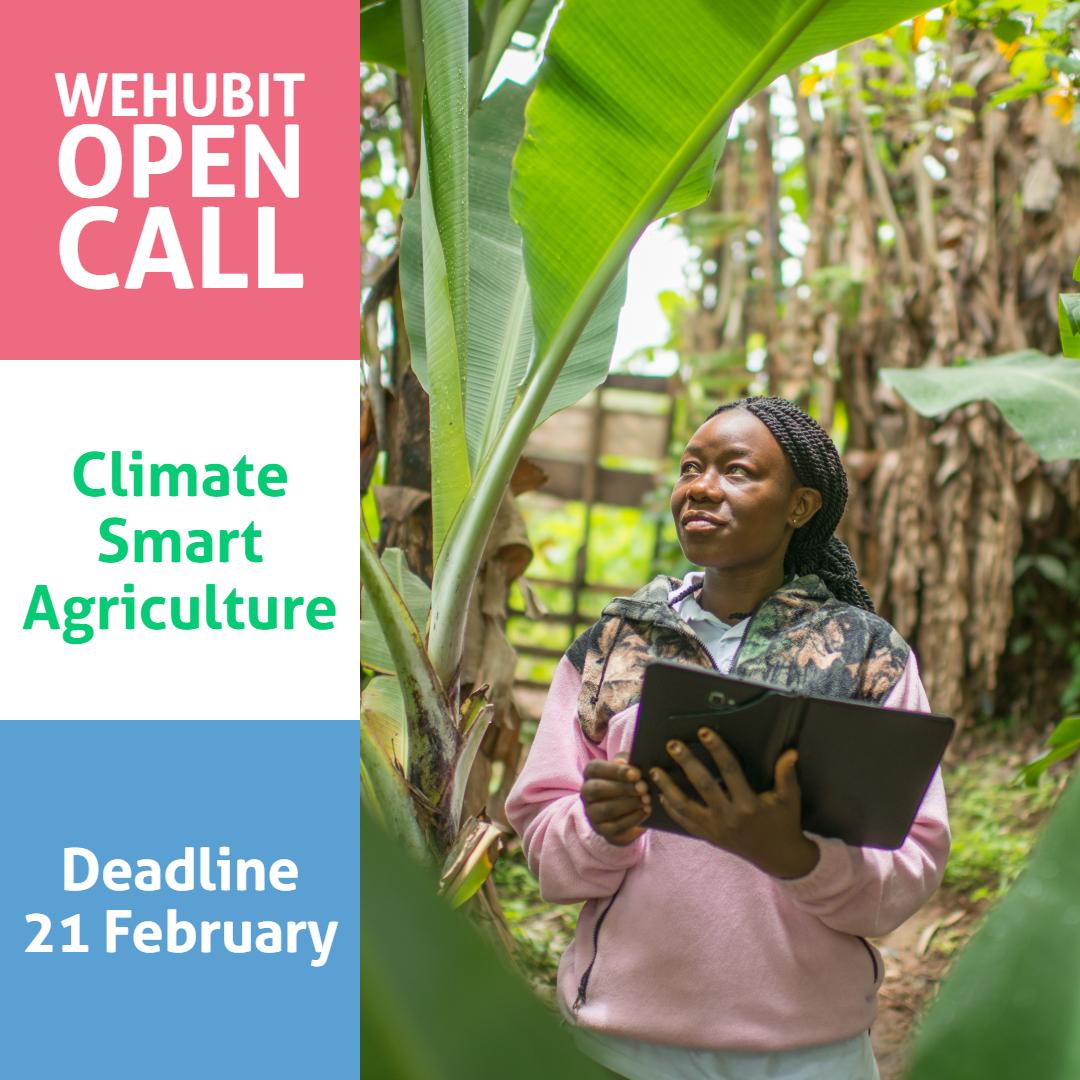
Call for proposal - Climate Smart Agriculture
Jasper VLIERS | 08/02/2019
Wehubit launches a new Call for Proposals focused on digital solutions to increase Climate Smart Agriculture. Are you a non-profit organisation located in one of the 14 partner countries of the Belgian Development Cooperation? Are you interested in Climate Smart Agriculture? Submit your project via www.wehubit.be.
-
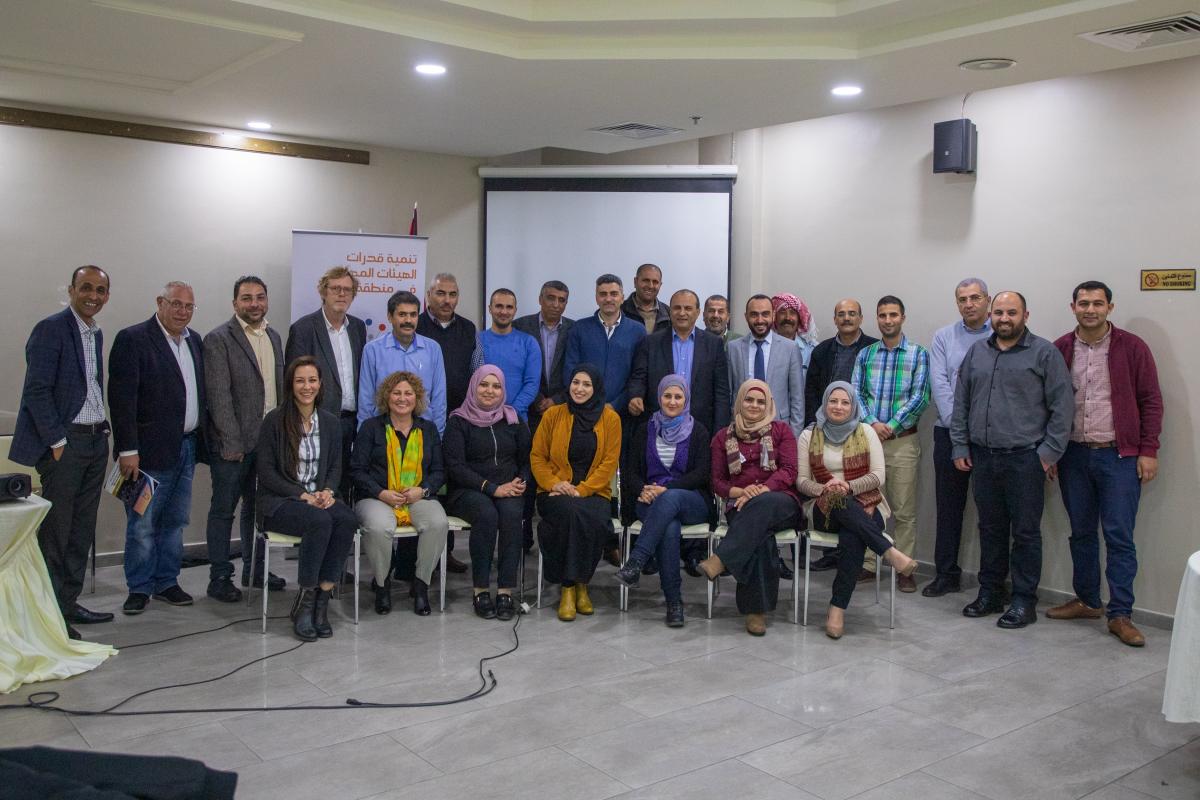
Barta'a presenting the first results of the ARD intiative
Laura SCHILLEMANS | 04/02/2019
The Barta’a Cluster organized a two-day workshop in Jericho, as part of the ARD (Area Resilience and Development) initiative Laboratory meetings, during which every partner cluster presents their progress, lessons learned, challenges and accomplishments to the other partner clusters. The workshop started with an introduction from the Barta’a’s communities on the challenges they face and the results they expect from the ARD (Area Resilience and Development) initiative. Then, the youth and the women of Barta’a gave a presentation on the community activities they are preparing to help implement the ARD initiative in the cluster. The first day ended with an overview of the achievements of the initiative up until now, and a view of their 2019 action plan. On the second day of the workshop, the cluster discussed the MOU (Memorandum Of Understanding) that defined the roles of and relationships between the communities of the cluster, during and after the initiative. This activity is part of the ARD (Area Resilience and Development) Initiative, as part of the Local Government Reform and Development Programme, implemented by the Ministry of Local Government and The Municipal Development and Lending Fund and funded by the Government of Belgium through Enabel, the Belgian Development Agency.
-
Convenio Perú – Bélgica ha permitido que familias de zonas vulnerables del Perú cuenten con el Seguro Integral de Salud
Guido COUCK | 31/01/2019
El trabajo conjunto entre el Seguro Integral de Salud, Superintendencia Nacional de Salud, Ministerio de Salud y Programa Nacional PAIS y Cuna Más del Ministerio de Desarrollo e Inclusión Social ha permitido establecer una red articulada para promover el Aseguramiento Universal en Salud en el Perú.San Martin, Cajamarca, Junín, Huancavelica y Piura fueron las regiones de intervención del Programa.Lima, Enero 2019.- Con una inversión de 16,500 millones de euros, el gobierno del Perú en alianza con el Reino de Bélgica, pusieron en marcha el Programa de Apoyo a la Política de Aseguramiento Universal en Salud en Perú a través del SIS (SISTEC) implementado por la Agencia Belga de Cooperación (CTB) y el Seguro Integral de Salud (SIS), con el financiamiento de la Cooperación Belga, que tiene como objetivos principales promover el aseguramiento universal en salud en regiones de pobreza y pobreza extrema, ampliar la cobertura de beneficios, mejorar la calidad de los servicios de salud y fortalecer el Seguro Integral de Salud.Según cifras del Instituto Nacional de Estadísticas e Informática (INEI) de 2017, el 21.7% de peruanos vive en situación de pobreza, hecho que impide o limita el acceso de estas personas a los servicios básicos como el aseguramiento de la salud, ya sea por el aislamiento geográfico, barreras culturales, desempleo, entre otros factores.Resultados obtenidosA cinco años de haberse ejecutado el proyecto, el martes 22 de enero, el SISTEC presentó los resultados del programa con la presencia de miembros del SIS, MINSA, SUSALUD, la Cooperación Belga, ESSALUD, entre otros.Entre los principales resultados el SISTEC ha hecho posible:La cobertura del SIS ha aumentado de 13 millones en el 2003 a 17,867,077 2018.Familias en situación de pobreza y pobreza extrema de 05 regiones del país acceden a un servicio de salud de mejor calidad, con enfoque de género e interculturalidad.Más de 50 mil nuevos afiliados gracias a la creación e implementación 14 oficinas de Atención al Asegurado del SIS (OAA) a nivel nacional. Además de afiliar, estas oficinas resuelven consultas, dudas o reclamos del asegurado, hecho que ha logrado mejorar la calidad de vida de miles de personas.El SISTEC ha logrado mejorar la gestión en salud y entre los principales resultados se cuenta con soluciones informáticas para automatizar los procesos del SIS.25 IPRESS (centros de salud) piloto han implementado planes de mejora para la atención al asegurado/a.Se ha brindado capacitación a más de 2 mil profesionales de salud en habilidades gerenciales y blandas.Se ha capacitado a más de seis mil personas de las cinco regiones en empoderamiento y derechos en salud para que conozcan cómo acceder a una atención médica de calidad, cuáles son los beneficios y cómo atenderse.Además se ha formado una red de 767 personas líderes/as comunitarios, gestores/as de tambos, asesores/as comunitarios en salud de 04 de las 05 regiones de intervención, quienes han sido fortalecidos como formadores/as en derechos y deberes en salud con un enfoque participativo de educación popular. 24 tambos de la región de Huancavelica son Puntos de Digitación, donde se brinda asistencia técnica, orientación sobre afiliación al SIS, canales de reclamo, derechos y deberes en salud, y todo lo concerniente a la cultura de aseguramiento.Aporte belgaEl embajador de Bélgica en Perú, Koenraad Lenaerts resalta que se ha logrado alcanzar los objetivos trazados hace cinco años. “El sector salud es muy importante para la Cooperación Belga, gracias al trabajo articulado con el Sistema Integral de Salud, se ha logrado desarrollar un sistema eficiente y sostenible, garantizando la atención médica de calidad para todos los peruanos y peruanas. Nos orgullece transferir estos conocimientos y resultados al Perú”, expresó el diplomático.Por su parte, la jefa del Seguro Integral de Salud, Dra. Doris Lituma Aguirre, declaró que a partir del 2013 las afiliaciones al SIS han incrementado de 13 millones a más de 17 millones al 2018. “Pero, además de ampliar la cobertura, nos hemos preocupado por empoderar a la población para que conozcan sus derechos a una atención médica de calidad y capacitar a los profesionales de la salud para mejorar la calidad y atención al asegurado”, señaló.Finalmente, la Ministra de Salud, Zulema Tomás, destacó la importancia de establecer una cultura de aseguramiento y empoderamiento de los asegurados para que sepan cuáles son sus derechos, los ejerzan y los defiendan.Red de CompromisosPara materializar la unión de todos los socios participantes del SISTEC mediante se realizó un acto simbólico para establecer una red de compromisos. Esta alianza representa el trabajo articulado multisectorial e intergubernamental desarrollado para promover el Aseguramiento Universal en Salud en el Perú.Con ello se expresa el compromiso que asume cada uno de ellas en continuar el trabajo realizado desde el Programa SISTEC, implementado por la Agencia Belga de Desarrollo (CTB/Enabel) en co-gestión con el Seguro Integral de Salud con el financiamiento de la Cooperación Belga, en favor de las poblaciones más vulnerables del país.Esta red fue conformada por el Embajador de Bélgica, Excmo. Sr. Koenraad Lenaerts, el Representante residente de la Agencia Belga de Desarrollo (CTB/Enabel) Sr. Patrick Gaudissart, la Jefa del Seguro Integral de Salud, Dra. Doris Lituma, la Jefa de la Oficina de Cooperación Internacional del Minsa, Dra. Wieslawa De Pawlikowski, la Directora de OFICOR de Susalud, el Coordinador Técnico del Programa Nacional PAIS del MIDIS, Sr. Jorge Ibañez y el líder awajún y facilitador del Programa Nacional Cuna Más del MIDIS, Sr. Pancho Tanques.
-
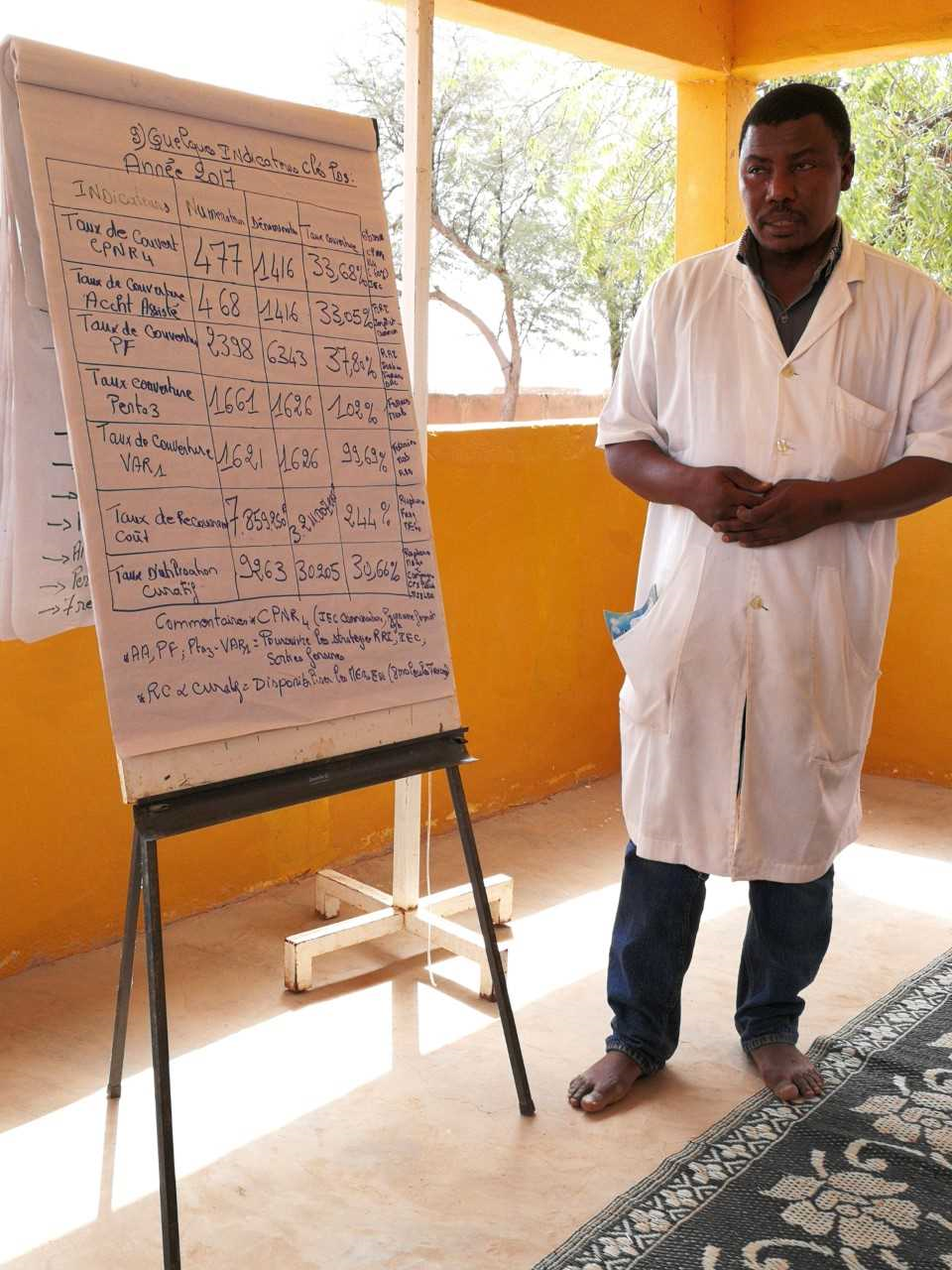
Le financement basé sur les résultats, première étape vers la mise en oeuvre de la couverture universelle de santé
Céline MEWISSEN | 30/01/2019
Le programme d'appui au système de santé a pour objectif d’améliorer l’accès des populations aux soins de santé primaires de qualité par la mise en oeuvre graduelle de la Couverture Universelle de Santé (CUS). Dans un premier temps, il mettra en place, en collaboration avec la Direction Régionale de la Santé Publique (DRSP) et l’Equipe Cadre de District (ECD), une Agence de Financement Basé sur les Résultats chargée du suivi mensuel des performances atteintes par chaque formation sanitaire, de la rétribution directe à chacune d’elles en fonction des performances atteintes et enfin de l’accompagnement technique des formations sanitaires dans l’utilisation de ces ressources (salaire du personnel médical, dépenses de fonctionnement, primes de motivation, etc.). Dans un deuxième temps, le PASS prévoit d’utiliser la mise en place du Financement Basé sur les Résultats, notamment l’expérience de l’Agence Départementale FBR, pour passer à une Agence Départe-mentale d’Assurance Maladie Universelle (AMU). Celle-ci inclurait les fonctions de : financement direct des prestataires ; prise en compte de la demande (la voix de la communauté sur la qualité des soins reçus) ; contrôle de la qualité technique des prestations ; gestion des adhérents à l’AMU et de l’utilisation de leur cotisation. On voit bien qu’il s’agit de reprendre les fonctionnalités du FBR en les amplifiant avec l’inclusion de la Demande et des adhérents à l‘AMU. Le chemin pour arriver à une couverture universelle de santé cou-vrant toute la population sera long. Le PASS a comme objectif d’aider le Ministère de la Santé Publique à faire les premiers pas dans les deux districts sanitaires appuyés (Gaya et Gothèye) couvrant plus de 500.000 habitants. En savoir plus : Le mécanisme de Financement basé sur les résultats La stratégie de financement basé sur les résultats (FBR) vise à augmenter la quantité et la qualité des soins préventifs et curatifs fournis à la population à travers la rétribution directe de la performance de chaque forma-tion sanitaire. Cette rétribution est effectuée sur la base d’un contrat de performance entre une partie qui paye (l’Agence Départementale du FBR) et une partie qui fournit les soins (les prestataires : Hôpital de district et le réseau de Centres de santé Intégrés-CSI).
-
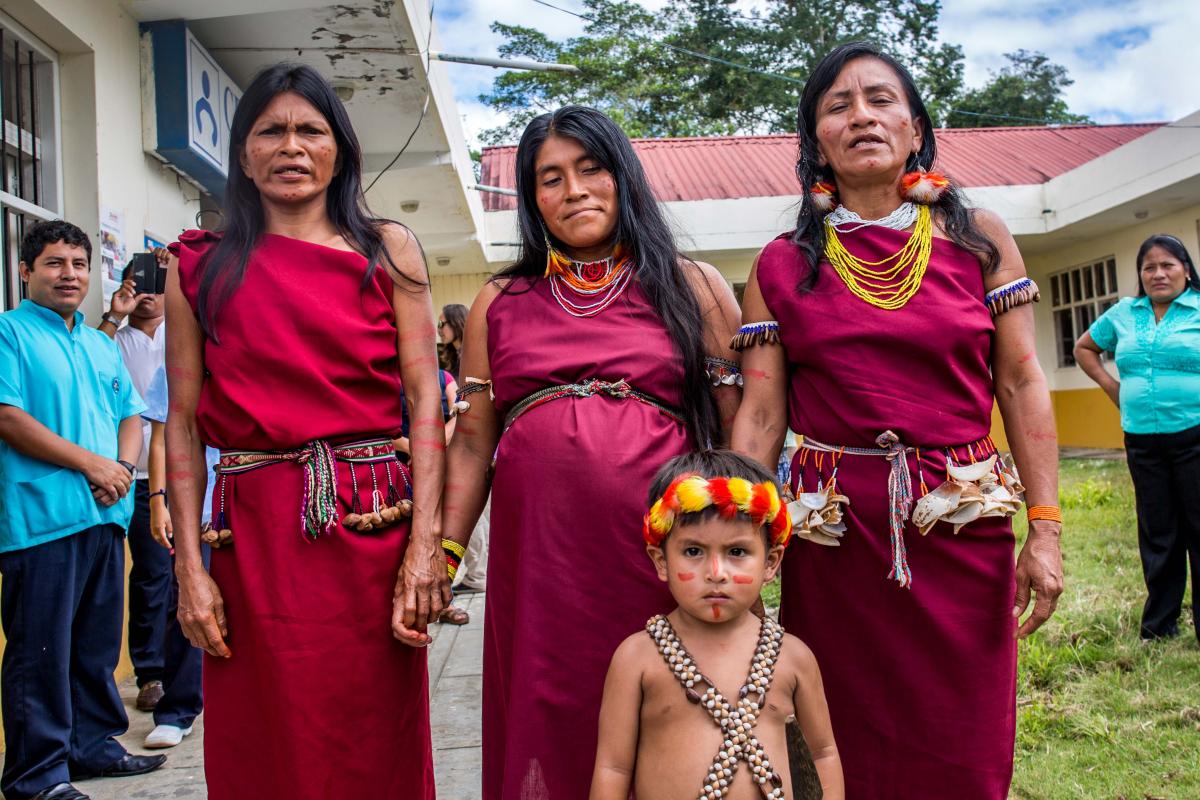
Resultados del SISTEC
Guido COUCK | 30/01/2019
Evento Experiencias de Aseguramiento en Salud basadas en evidencias: Hacia un Perú con Aseguramiento Universal en Salud (AUS)https://www.youtube.com/watch?v=TyO9wiC62Vo Resumen evento protocolar- Evento de Presentación de Resultadoshttps://www.youtube.com/watch?v=5z9vpM_MBHg Entrevista de Patrick Gaudissart sobre Programa SISTEC en Canal Nhttps://www.youtube.com/watch?v=KJ2XEla75YE
-
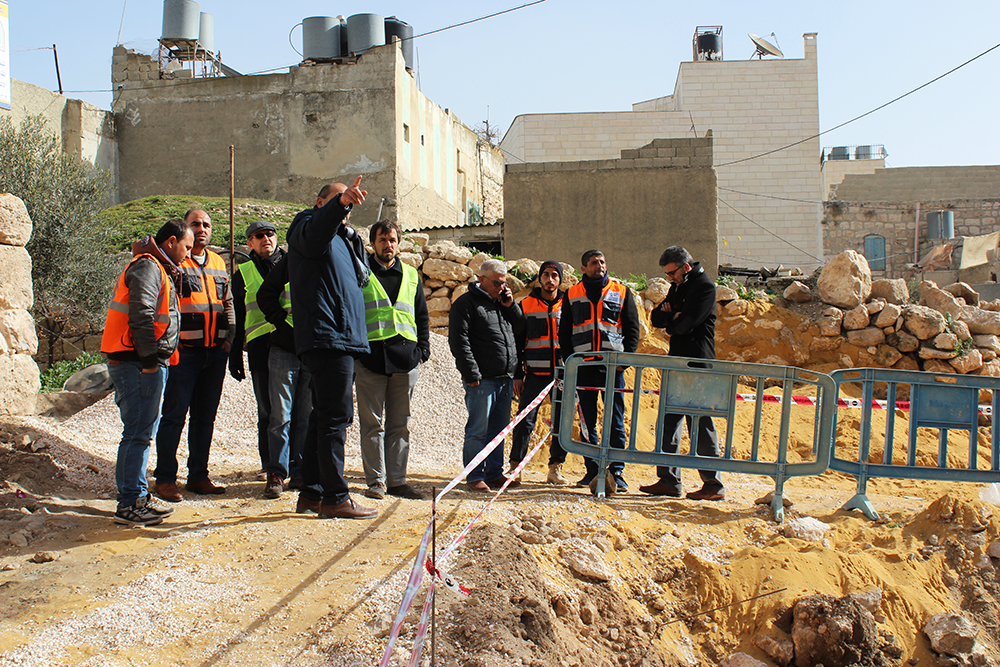
Field visit to Al Samu
Laura SCHILLEMANS | 28/01/2019
Last week, the Enabel team visited the construction works at Al Samu where the Regeneration of Historic Centers Program is rehabilitating the area. The “Hosh Ajwa” building is being restored to install a “one-stop shop”, housing the post office and property tax office. The “Al Ratrout” and “Al Daghamim” Hosh buildings will be used as a showroom, a gift shop, a translation center, a training center, and a library. A separate space will be allocated for kids to receive training courses and enjoy fun activities. ----------------- The Regeneration of Historic Centers program is implemented by the Ministry of Local Government and the Municipal Development and Lending Fund, in cooperation with the Ministry of Tourism and Antiquities, and funded by the Belgian Government through Enabel, the Belgian Development Agency.
-
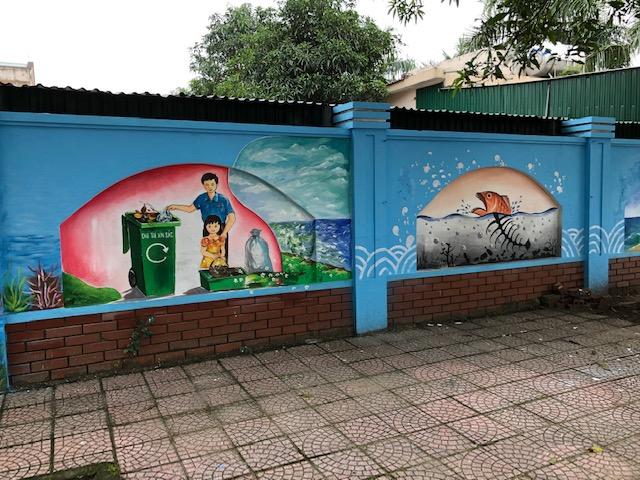
Youth Union in Cuo Lo town created fine interactive mural on environmental protection
Marion FISCHER | 28/01/2019
The Youth Union groups of Cua Lo town, jointly with students of the art school, painted more than 20 mural pictures, which describe the dangers of environmental pollution for the coast line and the economic and social life of the people. The pictures want to arouse the attention and care of the town people and the thousands of tourists in Cua Lo for a healthy environment. It is suggested to develop the site into a tourist visiting place and a means for conducting environmental education with school children and locals. Some of the pictures are very frank in their criticism of dangerous practices imposed on the environment by the foreign-invested big industrial enterprises.
